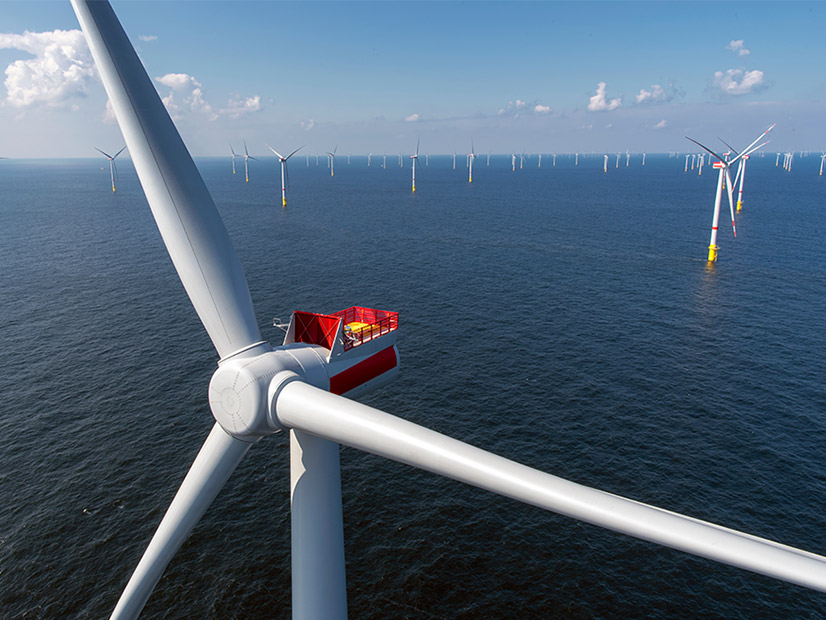New Jersey lawmakers moved several wind energy and vehicle electrification bills ahead last week in a flurry of activity before the legislative summer break begins. Both houses approved a key proposed law that will allow offshore wind developers to override local and state government to site transmission lines and related infrastructure for their projects on public land.
Passed Thursday, the offshore wind override bill, S3926, now sits on Gov. Phil Murphy’s desk. The Assembly last week also approved A1971, which would create a pilot program to use electric buses in three school districts, and A4899, which would extend to electric motorcycles the incentive program that the state operates to encourage the purchase of electric vehicles.
A fourth bill, A5840, also backed by the Assembly, would authorize the state treasurer and New Jersey Economic Development Authority (NJEDA) to partner on a lease for property and improvements for the New Jersey Wind Port project in South Jersey. The three Assembly-approved bills still need Senate approval to advance.
The votes came as lawmakers prepare to wind down activities for the summer on June 30. Little legislative action is expected before the Nov. 2 elections, when the governorship and Senate and Assembly seats are up for a vote. Pending bills can then be taken up and voted on before the end of the session on Jan. 11, 2022.
Removing Obstacles to Offshore Wind
The offshore wind legislation, S3926, is designed to smooth the way for offshore wind projects as New Jersey strives to reach the goal of deploying 7,500 MW of offshore wind capacity by 2035. The New Jersey Board of Public Utilities (NJBPU) on Wedneday is expected to announce the developer of the state’s second designated offshore wind project. The first project, the $1.6-billion Ocean Wind project awarded in 2019, will eventually put 98 wind turbines 15 miles off the Jersey shore. The state expects to award a total of six offshore wind projects by 2035.
S3926 would allow qualified offshore wind developers to site, construct and operate “wires, conduits, lines, and associated infrastructure” needed to connect an offshore project to the grid on public land, regardless of any opposition from local authorities as long as they are consulted. The bill stipulates that the connecting infrastructure should be buried underground.
The bill, approved 49 to 26 in the Assembly and 25 to 13 in the Senate, also would allow a qualified offshore wind developer to seek a waiver from the NJBPU to allow the project to advance if a local or state government body denied the project a critical easement or right of way.
Sen. Bob Smith (D), a bill sponsor, acknowledged at a Senate hearing earlier this month that the bill is “pretty powerful,” because it overrides the state’s long-held tradition of home rule, under which local authorities make the decisions that affect their own back yard. But Smith and other supporters said the need to move speedily to combat climate change makes the measure necessary.
The bill drew support from the New Jersey Chamber of Commerce and some environmental groups, while other environmentalists opposed it, saying it was an overreach that encroached on local power. (See: NJ Lawmakers Back Local Override for Offshore Wind Transmission).
Three Democratic Assemblymen who co-sponsored the bill, John Burzichelli, James Kennedy and Robert Karabinchak, released a statement after the bill’s passage saying that offshore wind projects are “poised to provide clean, renewable energy to New Jersey.”
“Once more projects begin, the benefits of getting involved in the sustainable energy industry will bring more jobs for residents and a significant investment into the State’s economy,” the statement said. “This legislation will further support the BPU’s timeline for solicitations of wind energy generation by making clearer the roles of these projects in municipalities.”
Electrifying Motorcycles, School Buses
Other clean-energy-related legislation that moved forward last week included:
-
-
- A5840 authorizes the state, through the NJEDA, to sign a lease and begin improvements on property in Lower Alloways Creek Township, where the state is seeking to build the New Jersey Wind Port. The project is part of New Jersey’s effort to create a manufacturing and logistics hub that will serve the offshore wind industry in the state and other parts of the East Coast. The NJEDA is in negotiations for property in the township that could be used for a marshalling, installation and manufacturing hub, according to the legislation. The bill passed the Assembly with a 48-25 vote, and a Senate vote is expected on Wednesday.
- A1971 would require the NJBPU to allocate $10 million to create a pilot electric school bus program. The aim of the project would be to ”determine the operational reliability and cost effectiveness of replacing diesel-powered school buses with electric school buses for daily transportation of students.” One of the three school districts selected for the pilot must be either a low-income, urban or environmental justice community. The selected districts or bus companies must file regular reports “detailing the cost to operate the electric school buses and any reliability issues related to the operation of the electric school buses.” The bill, which the Assembly backed 57 to 14, will now be heard by the Senate Economic Growth Committee.
- A4899 would extend the state’s program for providing incentives to electric vehicles with new incentives of up to $1,000 for electric motorcycles. The rules for calculating the size of the incentives would be created by the NJBPU. The bill passed the Assembly 72 to 3; an identical bill has yet to be heard in the Senate.
-



